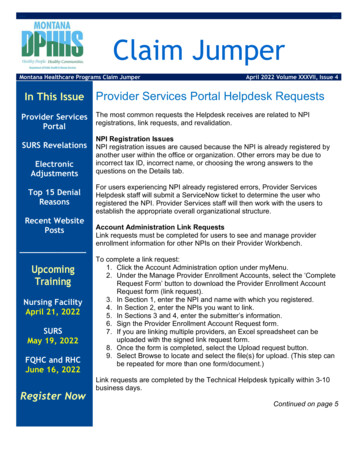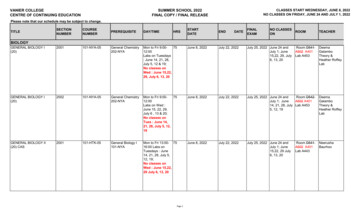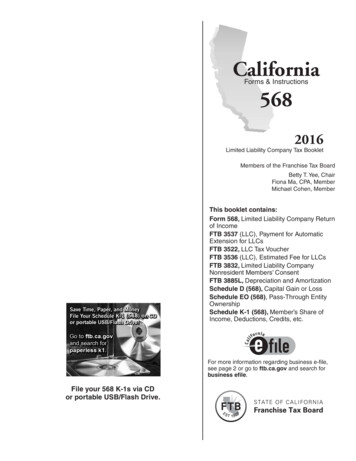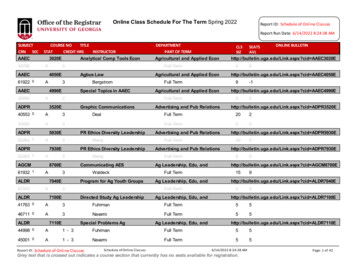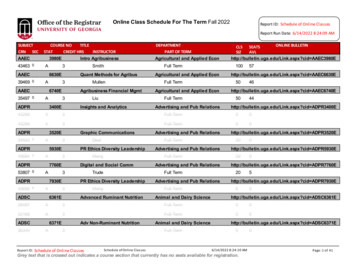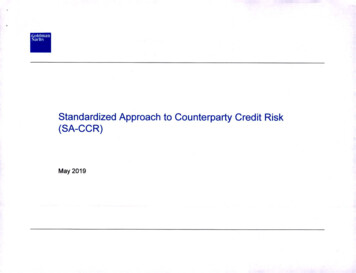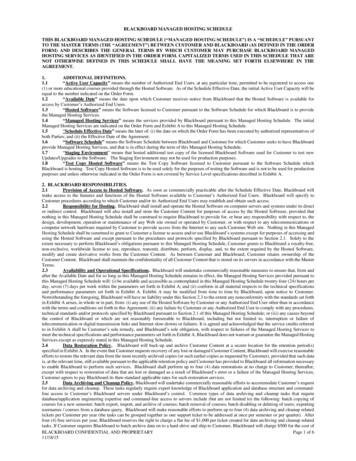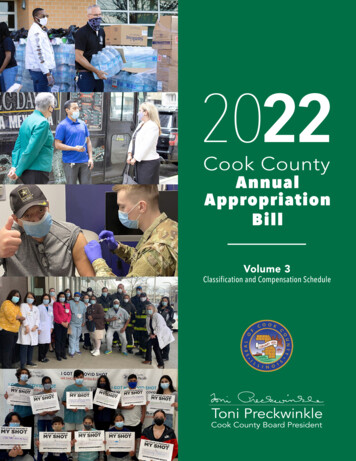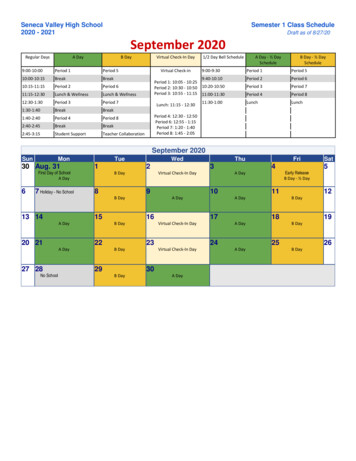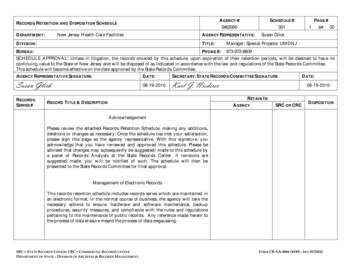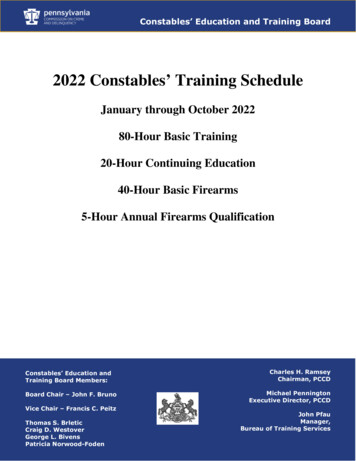
Transcription
Constables’ Education and Training Board2022 Constables’ Training ScheduleJanuary through October 202280-Hour Basic Training20-Hour Continuing Education40-Hour Basic Firearms5-Hour Annual Firearms QualificationConstables’ Education andTraining Board Members:Board Chair – John F. BrunoVice Chair – Francis C. PeitzThomas S. BrleticCraig D. WestoverGeorge L. BivensPatricia Norwood-FodenCharles H. RamseyChairman, PCCDMichael PenningtonExecutive Director, PCCDJohn PfauManager,Bureau of Training Services
Constables’ Education and Training BoardALL TRAINING COURSES ARE FILLED ON A FIRST-COME, FIRST-SERVED BASIS.Training Courses are limited in size and must meet specific minimum enrollment requirements as per trainingclass type. Those training class limits and minimums will be strictly enforced, so it is important to enroll early.Below are the minimum class sizes utilized by the program.Basic Training – 14 students minimumBasic Firearms – 9 students minimumContinuing Education – 16 students minimumAnnual Firearms Qualification – 16 students minimumIt is the constable and deputy constables’ responsibility to enroll into Training Courses to maintain theircertification for the next calendar year. To ensure uninterrupted certification, constables should enroll in TrainingCourses as soon as possible. Enroll early. Online enrollment is the fastest and easiest way to enroll.Constables’ Training Courses that are not meeting the minimum enrollment numbers may be combined and/orcanceled.Please enroll into Training Courses by May 31, 2022. You may not get the class or location of your choiceif you enroll after this time period.Important Notes for 2022Keystone Login is the login platform for CCETS and if you have any issues, you will need to contact their HelpDesk at 877-328-0995. Password can be reset by selecting the “Forgot Your Password?” link on the CCETSHome Page. If you have not already gone through the Keystone Login changes, please go s%27-Education-and-Training-Board.aspx for aKeystone Login User Guide that provides step-by-step instructions on how to register and login. Tocomplete the First-Time User Registration, go to: . Youcan also visit https://keystonelogin.pa.gov/Home/Help for answers to Keystone Login Frequently AskedQuestions.Please note that you do not need to register with Temple’s Canvas Learning Management System, if you havepreviously created your Canvas account. However, your Canvas password expires after ten months so you mayneed to change your password before you will be permitted to log back into Canvas in 2022.If you completed the 80-Hour Basic Training in 2021, you will need to register with Temple University’sCanvas Learning Management System to complete the 2022 Continuing Education requirements forcertification. Please check your email for important information from cesystems@temple.edu, on how toregister with Canvas. These emails will be sent in early January 2022. All constables and deputy constablesmust have an active Temple Canvas account in order to complete the 2022 12-Hour Online Subjects: LegalUpdates, Crisis Intervention and Service of Criminal Warrants. The Canvas User Guide is located es%27-Education-and-Training-Board.aspxPage 2
Constables’ Education and Training Board2022 Constables’ Training SchedulePlease Note: The 2022 Constables’ Training Schedule is arranged by geographic regions inPennsylvania. Constables have the option of attending training at any location in theCommonwealth, regardless of the area in which they reside.TABLE OF CONTENTSPageProgram Information4-82022 Constable Curriculum9-20Instructions for Class Enrollment Through CCETS21Highlights of CCETS Website for Constables22-23Online Grades and Enrollment in CCETS24Constables’ Training Transcripts25-27North West28-29North East30-31South West32-35South East36-39Training Enrollment Forms40-44Page 3
Constables’ Education and Training BoardProgram InformationAddress ChangePersonal Information ReviewPer Board Policy: A person shall register with the Board for certification by submitting information such asmailing and/or email addresses, telephone number, Social Security Number, date of birth and office held orsought. A constable shall set forth the beginning date and expiration date of the term of office held and providedocumentary evidence of election or appointment. A registrant shall inform the Board of a change to registrationinformation within 15 days of the change (Title 37 §431.11 (b)).Change of Registration Information can be updated on-line through the Constables’ Certification, Education andTraining System (CCETS). Refer to page 21 for more information regarding CCETS. Change of registrationinformation can also be completed by mail or FAX to: Bureau of Training Services, Pennsylvania Commissionon Crime and Delinquency (PCCD), PO Box 1167, Harrisburg PA 17108-1167; FAX (717) 783-7140 or bycontacting your training region’s PCCD contact at the email or phone number listed below:Contact Information at PCCD(If you have questions regarding certification, insurance, or where to send your election certificate orappointment order.)THESE ARE NOT CONTACTS FOR CLASS ENROLLMENTWESTERN PA: Adams, Armstrong, Allegheny, Beaver, Bedford, Blair, Butler, Cambria, Cameron, Centre,Clarion, Clinton, Crawford, Cumberland, Elk, Erie, Fayette, Forest, Franklin, Fulton, Greene, Huntingdon,Indiana, Jefferson, Juniata, Lawrence, Mercer, McKean, Mifflin, Perry, Potter, Somerset, Venango, Washington,Warren, and Westmoreland CountiesYour contact person is: Tracy Beaver, (717) 265-8552, trabeaver@pa.govEASTERN PA: Berks, Bradford, Bucks, Carbon, Chester, Columbia, Dauphin, Delaware, Lackawanna,Lancaster, Lebanon, Lehigh, Luzerne, Lycoming, Monroe, Montgomery, Montour, Northampton,Northumberland, Pike, Schuylkill, Snyder, Sullivan, Susquehanna, Tioga, Union, Wayne, Wyoming, and YorkCountiesYour contact person is: Nick Hartman, (717) 265-8551, nihartman@pa.govPage 4
Constables’ Education and Training BoardCOVID ProtocolsThe following protocols will be implemented for the 2022 Training Year. The complete documentation on theCOVID Protocols and the Act 49 Training COVID Screening Form can be found es%27-Education-and-Training-Board.aspx Constables must wear a face mask or face shield during the entirety of classroom instruction or rangeactivities, see exceptions on COVID protocols.No face mask or face shield, no admittance to class!o If removed from class for declining to wear a face mask or face shield, instructors will note thison the Act 49 COVID screening form.If wearing a face shield during an Annual Firearms Qualification Course, safety goggles must also beworn under the face shield during range activities.o The lead firearms instructor will have discretion if this creates a safety issue on the range.Failure to Withdraw from Training CoursesBelow is information on the current Board Regulations regarding the constable’s failure to provide timelynotification when withdrawing from a Constables’ Training Course. There have been several questions fromconstables and deputy constables who failed to withdraw from a Training Course in a timely manner and are nowrequired to pay to attend another Training Course.37 Pa.C.S. §431.25(a); §431.35(a); and §431.47(a). Attendance policies:Withdrawal. A constable who enrolls for Basic, Continuing Education, or any Firearms Qualification Coursemay withdraw from the Course without penalty upon timely notification to the school conducting the Basic,Continuing Education, or any Firearms Qualification Course. A notification shall be deemed timely if it isdelivered to the director of the school or a designee no later than 7 calendar days prior to the start of classes. Theschool may assess a failing grade for all or part of the Training Course, if the constable fails to provide timelynotification or to show good cause. A notification shall be deemed untimely if the notice is not received by thedirector of the school or a designee within 7 calendar days prior to the start of classes.37 Pa.C.S. §431.25(b); §431.35(b); and §431.47(b). Attendance policies:Financial Responsibility. If notification to withdraw is not given or is deemed untimely and good cause is notshown, and the constable wishes to attend another Training Course in the same training year or in the next trainingyear, the constable shall bear financial responsibility for the cost of the additional Basic, Continuing Education,or Firearms Qualification Course. Payment must be received by the Commission at least 2 weeks prior to theclass start date in the form of a certified check or money order.Page 5
Constables’ Education and Training BoardTraining Course FailuresBelow is information on the current Board Policy regarding training class failures.3. Training Course Failures.a. A constable or deputy constable who fails a basic training, basic firearms, continuing education, orfirearms qualification course after January 1, 2020, shall bear the financial responsibility to attend anadditional course regardless of the training year in which the failure occurred.Class payment charges for no shows and failures for the 2022 training year are as follows:Basic Training: 1,125.00 (Must be paid prior to enrollment)Basic Firearms: 1,485.00 (Must be paid prior to enrollment)Continuing Education: 210.00 ( 10.50 per 20 module hours)Annual Firearms: 115.00If you have any questions regarding the Board’s attendance or failure policies, please call Sherry Leffler at 717265-8554 or by email at sleffler@pa.gov.If you have an emergency prior to the class start date, please contact the appropriate Training Delivery Contactlisted below. Please do not contact PCCD Staff to enroll, withdraw, or transfer Training Courses.Training Delivery Contractor Contact InformationWestern Region: Penn State University - Justice and Safety Institute, Tony Mucha – (814) 865-8051,(814) 863-3108 (FAX) and email txm52@psu.eduEastern Region: Temple University, Dee Beiter – (267) 468-8331, (267) 468-8660 (FAX) and emaildeidre.sherman@temple.eduPage 6
Constables’ Education and Training BoardEnrollment Instructions for Classroom Training CoursesALL TRAINING COURSES ARE FILLED ON A FIRST-COME, FIRST-SERVED BASIS. TrainingCourses are also limited in size. Size limits are strictly enforced, so it is important to register early. To ensureuninterrupted certification, constables should enroll in Training Courses as soon as possible. Enroll early.Online enrollment is the fastest and easiest way to enroll.If you have not done so already, please make sure to register as a user in the Constables’ Certification, Educationand Training System (CCETS). Do not wait until the 2022 Courses are open for enrollment to register for CCETS.If you register early in CCETS, you can then familiarize yourself with the system and how to enroll in courses,view training history, view and change personal information and share information with other certified constablesand deputy constables. Program Staff must approve the registration prior to logging into CCETS.Online enrollment is secure, fast, and confirmed immediately. Enrollment can also be accomplished by mailingor faxing a completed standard enrollment form directly to the Training Delivery Contractor. The standardenrollment forms can be found online and are included in this training schedule. The fax and address informationfor the Training Delivery Contractor contacts can be on page 6. Do not mail or fax enrollment forms to PCCD,except for Basic Training and Basic Firearms enrollment forms.Enrollment questions should be referred to the appropriate regional Training Delivery Contractor. Constablescannot enroll for Training Courses by calling or emailing PCCD, please contact the appropriate regional TrainingDelivery Contractor.If class times and dates are changed, the regional Training Delivery Contractor will notify you of the change.Notification of cancellation will be made by the regional Training Delivery Contractor via registrationinformation filed by constables.Enrollment Instructions for Online Training CoursesPlease note: All active and certified constables and deputy constables will automatically be enrolled intothe required online subjects in Temple’s Canvas System. These three online subjects will be available inCanvas on Tuesday, January 18, 2022.Please keep in mind that Temple’s Canvas System and CCETS (Keystone Login) are two different Usernamesand Passwords. For Canvas related issues, please contact their Help Desk at 267-468-8605 (Monday to Friday 8am to 1 pm) or 215-204-8000 after those hours.For Persons with a Record of a DisabilityIf special arrangements are required for a person with a record of a disability to participate in any ConstableTraining Course, the person must contact the appropriate regional Training Delivery Contractor at least twenty(20) days prior to the class start date.Page 7
Constables’ Education and Training BoardClass Confirmation LettersPlease thoroughly read the class confirmation letters to make sure you have the mandatory items neededfor each Training Course type (relating to clothing and equipment). If these mandatory items are notbrought with you to the Training Course, you will be asked to leave the training class. Your attendance willbe documented as an “excused” absence; however, you will need to reschedule the missed portion of the TrainingCourse once the mandatory items are obtained. The confirmation letters may also contain more specificinstructions on arrival times and facility related information, so it is very important that you check youremail account regularly.Liability InsuranceAct 49 (§2942 (b)) states that any constable or deputy constable who fails, neglects or refuses to maintain a currentinsurance policy as required, or to file proof thereof with the County Clerk of Courts, shall cease automaticallyto be certified to perform judicial duties upon the expiration of the policy of which proof has been filed with theCounty Clerk of Courts. To ensure uninterrupted constable certification, it is essential that every constable file anew certificate of insurance with the County Clerk of Courts before the current insurance policy expires.Re-Election/Election Certificates andAppointment OrdersIn order to ensure continued, uninterrupted certification, if you are re-elected or elected in November 2021,you must forward a copy of your new election certificate from the county Board of Elections to the PCCD viamail, email or FAX to: Bureau of Training Services, Pennsylvania Commission on Crime and Delinquency, POBox 1167, Harrisburg PA 17108-1167; FAX (717) 783-7140.If you are a constable or deputy constable who has been newly appointed or re-appointed, you must forward acopy of your new appointment order signed by the President Judge of the Court of Common Pleas.If your “new” election certificate or appointment order is not received by Program staff by December 31, 2021,access to CCETS will automatically be turned off and constables and deputy constables will not be able toenroll into 2022 Continuing Education or Annual Firearms Qualification Courses due to the expiration of theterm of office on December 31, 2021.However, if you have completed the training requirement in 2021, once your “new” election certificate orappointment order is received and updated in CCETS, your certification will be active. There may be a period inwhich your certification is inactive until the updated term of office information is received.Page 8
Constables’ Education and Training Board2022 Constable Training Curriculum80-Hour BASIC TRAININGAll newly elected constables or appointed deputy constables are required, under Act 49-2009 §7142(a) to attendand successfully complete Basic Training in order to perform judicial duties and be paid. Constables andappointed deputy constables must be registered with PCCD. For more information, please visit PCCD’s websiteat www.pccd.pa.gov or telephone PCCD, at (717) 265-8551, (717) 265- 8552 or (717) 265-8554.At the February 14, 2019 Constables Education and Training Board (Board) Meeting, the Board voted a constableor deputy constable who is elected or appointed must pay for the expense of the Basic Training Course and theBasic Firearms Training Course starting January 1, 2020. The Pennsylvania Commission on Crime andDelinquency (PCCD) approved this change at its September 11, 2019 meeting. The cost of a Basic TrainingCourse and Basic Firearms Training Course will be determined by Program Staff and published yearly. For 2022,the cost of Basic Training is 1,125.00 and the cost of Basic Firearms is 1,485.00.Refer to Title 37 Law, Chapter 431, for Regulations relating to the certification of constables and deputyconstables. To successfully complete Basic Training, an individual must attend and participate in all training asscheduled during the same training year, achieve a passing score of at least 70% on each written examinationadministered during the Course, and successfully demonstrate practical skills during each proficiencyexamination. Each subject presented during the Basic Training includes a written examination. An individualwho receives less than 70% on any written exam will have only one opportunity to re-test in that subject. If anindividual fails the re-test, that individual has failed the Basic Training Course and will not be certified by theBoard.Basic Training will consist of instruction in the following subjects: Role of the Constable in the Justice System,Professional Development, Civil Law and Process, Criminal Law and Process, Use of Force, Mechanics of Arrest,Defensive Tactics, Prisoner Transport and Custody, Court Security, Crisis Intervention, Management ofAggressive Behavior (MOAB), Expandable Baton, and Oleoresin Capsicum (OC).Role of the Constable in the Justice System (4-Hours)This block of instruction provides an overview of the evolutionary development of the constable in Pennsylvania.It clarifies the constable’s legal responsibilities, as well as identifying civil liability issues that may affect theoffice of the constable. In addition, constables are presented with a working knowledge of the Pennsylvaniajustice system.Professional Development I – Formal Communication (4-Hours)Formal communications are an important skill in any profession. Given the position of the constable inPennsylvania's judicial system it is especially important for constables to understand the importance of formalcommunications and how it impacts their day-to-day operations. The Course includes an introduction to basicinterview skills along with the basic principles of report writing.Page 9
Constables’ Education and Training BoardProfessional Development II – Professional Conduct (4-Hours)This Course was developed to facilitate constables' understanding of the issues of professional conduct and howthey impact their day-to-day operations. The Course presents an introduction to the development of moralstandards and the importance of ethics for constables. Other specific areas that are discussed include individualresponsibility and standards, relationships with the community and cultural diversity.Civil Law and Process (12-Hours)This instruction focuses on many of the constable’s duties in the area of civil procedure, including service ofprocess. The topic considers procedural rules that are applicable throughout the Commonwealth under Title 246,Minor Court Civil Rules, while directing constables to be cognizant of local rules and customs. Specificemphasis is placed on the citation of rules of Chapters 200, 300, 400, 500, 800, and 1200. Additionally, Title 42.Chapter 62A. Protection of Victims of Sexual Violence or Intimidation (Act 25 of 2014, which became effectiveJuly 1, 2015) will be reviewed.Criminal Law and Process (8-Hours)This Course introduces constables to the history and development of criminal law in Pennsylvania. Constables’specific duties within the criminal process are highlighted, as well as their authority and responsibilities in theareas of arrest, accountability for property and monies, and the most current law dealing with constable authority.Use of Force (4-Hours)This training provides the constable with working knowledge in the areas of both lethal and non-lethal use offorce. Recent case law pertinent to use-of-force issues is presented.Mechanics of Arrest (8-Hours)This Course is designed to provide the constable with proper techniques for the arrest of compliant and noncompliant persons. These techniques utilize subject control holds and takedowns and direct the constable toperform the arrest from a position of advantage. The constable will be provided proper handcuffing and searchingtechniques for compliant and non-compliant individuals.Defensive Tactics (10-Hours, 30-Minutes)This 10-hour and 30-minute block of instruction presents the constable with techniques for self-defense againstarmed and unarmed attackers. The defensive techniques presented include basic patterns of movement,reactionary gap/interview stance, ground fighting (offensive and defensive), arm locks, defense against gundisarms, blocking techniques, hand and arm striking skills, and kicking skills. Constables must come preparedfor physical activity and dressed appropriately. In addition, this session provides the constable with techniquesfor retaining the holstered handgun from attack. These techniques will also provide the constable with the abilityto prevent attacks on his/her holstered handgun. Each constable must demonstrate a working knowledge of eachtechnique. The constable must supply his/her duty belt and holster.Prisoner Transport (4-Hours)This Course provides Pennsylvania's constables with the procedures to properly handle prisoners in correctionalfacilities, in the transport vehicle or van, during movement, and throughout escort into court. The training alsoaddresses numerous variables of prisoner transport, including constable safety, prisoner movement preparations,proper control and restraint, and special considerations such as pregnant or suicidal prisoners. The Courseincludes discussion on movement and transportation issues based on several actual incidents that have occurredthroughout the United States. This segment provides constables with actions and precautions that they can employto reduce the possibility that a prisoner will escape their custody or that a problem will occur during transport.Page 10
Constables’ Education and Training BoardCourt Security (4-Hours)This block of instruction provides an overview for the constable’s role in courtroom security. The constable willreview the preliminary aspects of security to heighten his/her awareness of the potential problems that may arisein the courtroom. Issues to be discussed will include but are not limited to threatening behavior, searches,evaluation techniques, as well as responding to emergencies.Crisis Intervention (5-Hours, 30-Minutes)This course provides the constable with a review of how to de-escalate high-stress incidents that have the potentialto evolve into a life-threatening situation. Emphasis is placed on understanding the signs of aggression includinginterpreting body language as well as the recognition of other behavioral signals, so that the constable may beable to avoid potential harm to themselves or others. The Course also discusses the advantage of developing andmaintaining acute listening skills as they relate to possible confrontational situations and de-escalationOCAT Oleoresin Capsicum (OC) (4-Hours)This 4-hour block of instruction covers the practical applications of Oleoresin Capsicum (pepper) spray. Theclass is divided into lectures and practical exercises. Lectures cover the characteristics, effects, proper usage, anddecontamination of OC spray, as well as a review of the use-of-force continuum. Practical exercises reviewproper carrying and drawing techniques, body positioning, proxemics, patterns of movement, and spraying.Scenarios cover spraying a combative subject in a variety of settings, including single-constable, contact/cover,and constable-down situations.Personal Protection Baton Tactics (4-Hours)This course will provide training for both straight and expendable baton techniques as a method of controllingnon-compliant or violent individuals, in circumstances constables may encounter during the execution of theirduties. The content of the PPBT training will cover identification of threat recognition, threat reduction, and theexecution of a myriad of tactical measures to render compliance and/or to mount defensive techniques forconstable safety. Upon completion of all training materials formal certification is provided to each trainingparticipant.Management of Aggressive Behavior (MOAB) (4-Hours)MOAB presents principles, techniques, and skills for recognizing, reducing and managing violent and aggressivebehavior. The program also provides humane and compassionate methods for dealing with aggressive behavior.20-Hour CONTINUING EDUCATIONConstables and deputy constables must successfully complete the 20-Hour Continuing Education Course in 2022to renew their certifications for 2023. Based upon successful completion of Continuing Education by Friday,November 18, 2022 at 5:00 pm, constables and deputy constables will be issued certification cards in December2022, which will indicate certification for 2023.Please note: All active and certified constables and deputy constables will automatically be enrolled intothe required online subjects in Temple’s Canvas System. These three online subjects will be available inCanvas on Tuesday, January 18, 2022.Page 11
Constables’ Education and Training BoardService of Criminal Warrants (4-Hours online)Service of Criminal Warrants will introduce this content area by detailing the different types of warrants andwarrant procedure that can be executed by constables in the field. Fourth Amendment issues, forcible entry,and qualified immunity will be discussed as will pre-warrant service preparation and best practices forexecuting a criminal warrant. Two court cases will be reviewed. This subject area will conclude with afterincident review and post incident report instruction. This course includes a written examination.Legal Updates (4-Hours online)This four-hour module will cover legal updates and significant decisions that impact constable duties. Acomprehensive review of civil process best practices for the handling of landlord/tenant disputes will becovered in this subject. This information will be supplemented with an explanation of issues stemming from theCOVID-driven eviction moratorium. Case law on the following issues will be reviewed; a constable’s inabilityto enforce Title 75, violation of Constitutional rights during prisoner transport, and excessive use of force.Finally, material will be reviewed on cases and penalties related to a constable’s failure to submit the Statementof Financial Interest Form, in order to reinforce concepts from Ethics curriculum presented to constables inrecent training years. This course includes a written examination.Crisis Intervention (4-Hours online)Crisis Intervention is a four-hour online subject that will describe with a crisis is, and what crisis interventionresponses entail. Detail will be provided on the physical, mental, and emotional experiences people undergowhile in a state of crisis. Recognition of triggers and signs of impending crisis will be a central focus of thiscontent, as will management of emotionally disturbed and suicidal individuals undergoing crisis. De-escalationtechniques and resources for people in crisis are provided throughout this content. This course includes awritten examination.Defensive Tactics (8-Hours classroom)Defensive Tactics covers in-person hands-on subject matter pertaining to physical safety for constables while inthe field. A portion of this subject will be dedicated to formal instruction, while the bulk of the content will behands-on execution and practice of the skills taught. Situational awareness and tactical advantage will bepresented in addition to weapons systems and retention, ground considerations, restraining and searching ofprisoners and basic combative skills. At the conclusion of instruction, assessment of physical skills will beevaluated. This course includes a written examination.Page 12
Constables’ Education and Training BoardPlease note: All 2022 firearms qualifications will begin at the 25-yard line (Stage 6 CQC) and finish at the2-yard line (Stage 1 CQC). Qualifications will continue as normal, completing and scoring Phase II, thenproceeding to Phase I, see page 14 for more details.40-Hour BASIC FIREARMSThe 40-Hour Basic Firearms Training Course is designed to provide an essential grounding in acceptable lawenforcement techniques for any constable who is not Act 49 certified with a weapon and who is not precludedunder State or Federal law from possessing or using a firearm. The Course consists of a series of lectures,laboratory activities, and practical exercises that provide a basic understanding in the safe manipulation of aservice revolver/pistol. It starts with the presumption that the participant has little or no formal training. TheCourse stresses safe handling techniques, proper cleaning, correct weapons handling skills and marksmanship.As part of the training, the constable will be exposed to firing in reduced light and to interactive judgmentalshooting scenarios. It is offered upon the conclusion of the 80-Hour Basic Training Course.The CQC is divided into two stages. A shooter must qualify on each phase with a score of at least a 75%. Theshooter who fails to pass one of the phases will be permitted to repeat the phase on which he or she did not
Courses as soon as possible. Enroll early. Online enrollment is the fastest and easiest way to enroll. Constables' Training Courses that are not meeting the minimum enrollment numbers may be combined and/or canceled. Please enroll into Training Courses by May 31, 2022. You may not get the class or location of your choice
